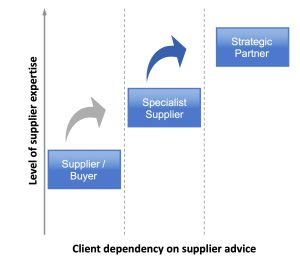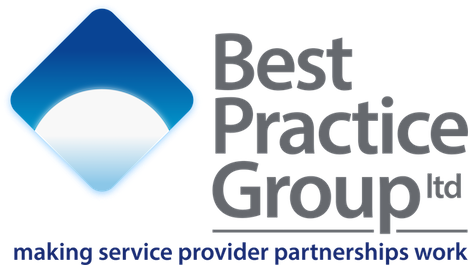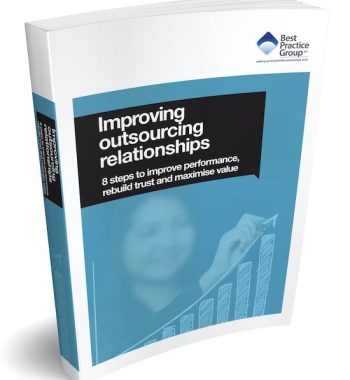
In this ‘Back to Basics’ article, we’ll answer the question ‘What is a strategic partnership?’ by being clear about what distinguishes strategic partnerships from other types of supplier relationships. We’ll look at some common features of strategic partnerships, the potential benefits of delivering complex services through strategic partnerships and offer some thoughts on why they sometimes fail. At the end we offer some suggestions for further reading on related topics that you might find useful.
What is a strategic partnership?
In the context of strategic supplier/vendor relationships, a strategic partnership is a relationship between at least two commercial entities (client and supplier), designed to solve a business problem and deliver key client solutions and is usually formalised by a contract. Strategic partnerships may also be referred to as strategic supplier relationships, or complex supplier relationships.
Strategic partnerships can develop over time, as with strong outsourcing relationships that build commercial trust and collaborative behaviours driving innovation and the pursuit of mutually beneficial outcomes, or they can be stipulated from the outset during the sourcing process. Whichever way they are formed, strategic partnerships should strengthen collaboration and drive a culture of creativity, innovation and shared ownership between both client and supplier.
What other types of supplier relationships are there?
Supplier relationships can be largely grouped into three key types, determined by the supplier’s level of expertise and to what extent the client will rely on the supplier’s advice.
Types of Supplier Relationships:
 Supplier/buyer: This first level of relationship is a common one we would all recognise in which the buyer really is the expert; it knows what it wants and needs, and the supplier must deliver to the buyer’s spec and plan. The risk is that if, as the buyer, your specification is wrong or you have misunderstood what the supplier is going to provide, that is often your problem. An example relationship would be the buyer procuring office materials from a stationery supplier.
Supplier/buyer: This first level of relationship is a common one we would all recognise in which the buyer really is the expert; it knows what it wants and needs, and the supplier must deliver to the buyer’s spec and plan. The risk is that if, as the buyer, your specification is wrong or you have misunderstood what the supplier is going to provide, that is often your problem. An example relationship would be the buyer procuring office materials from a stationery supplier.
Specialist Supplier: In this relationship, the buyer has much more reliance upon the supplier’s advice. There is mutual expertise, but the main thrust to going to the market is to get the expert insights, skills and usually technologies you need to get the outcomes you require. In this type of relationship the buyer organisation also brings skills, and hence there is a collaborative approach (done with you). In this type of relationship the buyer is advised to say, “Here is our problem” and the supplier, with the buyer, will use their skills to solve the problem.
Strategic Partner: In this type of relationship, the buyer is much more reliant upon the advice of the supplier to solve their problem. For example, the buyer needs to reduce costs by 30% and whilst they may have their own ideas, they ask the supplier to identify from their own experience and expertise the most effective manner in which they can achieve those costs savings for the buyer. It is the outcome of the cost savings that is what the buyer will contract the supplier for. Strategic partners are usually experts in their fields, and as expert suppliers they have ‘Expert Responsibilities’ implied by law.
Features of Strategic Partnerships
Strategic partnerships generally share some common features, they:
- Involve the delivery of complex services/technology solutions such as large-scale complex Transformation, IT Solutions, Integration, Hard/Soft FM, Construction, Infrastructure
- Deal with mission-critical services with co-dependencies (e.g. critical IT systems or Hard FM Health and Safety)
- Require high levels of trust and collaboration to drive innovation and maximum value
- Involve multiple sub-contractors under the leadership of a prime service partner
- Have the potential for high commercial and reputational risk – with often millions of pounds at stake for service delivery across many co-dependent services, which if not delivered, presents a high risk of personal and corporate reputational damage
- Require the management of multiple Stakeholder Relationships, often with competing business priorities.
- Recognising and optimising these features can assure commercial success.
What are the benefits of delivering complex services through strategic partnerships?
If set up and managed in the right way, strategic partnerships can be long-lasting and rewarding arrangements for all parties, client, supplier, stakeholders and end users. For the client, particularly public-sector clients, the benefits can include:
- Access to specialist expertise, knowledge and best practice
- Access to technology, people and skills
- Transfer of risk
- Opportunity to innovate for continuous improvement and drive BAU best value
- A more effective use of public money delivering improved services and outcomes for citizens and society.
Why do strategic partnerships sometimes fail?
Strategic partnerships will fail to get off the ground if the collaborative advantage is not understood by all parties. If you do not have a shared vision with your strategic partner or clearly articulated requirements, objectives and outcomes right from the start, then your partnership could be beset by problems and ultimately fail to achieve its goals. However, even when outcomes and objectives are agreed at the outset, the real world of complex service delivery means that change will be inevitable, so it is essential that your partnership is supported by a flexible contract structure and reshaping governance. Ideally you should have a 6-monthly reshaping process to revisit outcomes, KPIs and contract terms to ensure that they all continue to align.
Your contract terms and KPIs should be designed to drive the right collaborative behaviours from all parties rather than be used as sticks to beat the supplier with when problems begin to occur. You can find out more about flexible contract structures, KPIs and driving the right behaviours from more of our articles and FAQ responses listed below.
Use the links below to explore further articles related to ‘what is a strategic partnership’:
What are the characteristics of a strategic partnership that is operating successfully?
What is Commercial Trust and why is it important in Strategic Partnerships?
How to ensure your KPIs will achieve your required outcomes.
Run your KPIs through ‘Use Cases’ to ensure they will drive the right behaviours.
Flexible contract structures that drive the right behaviours for successful strategic partnerships.
Do you need help with your strategic partnership?
If you need some advice or would see value in a confidential (no obligation) chat about your strategic partner relationship or project, call 0845 345 0130 or you can book a call directly with Allan Watton (BPG’s CEO) using the calendar feature here.

